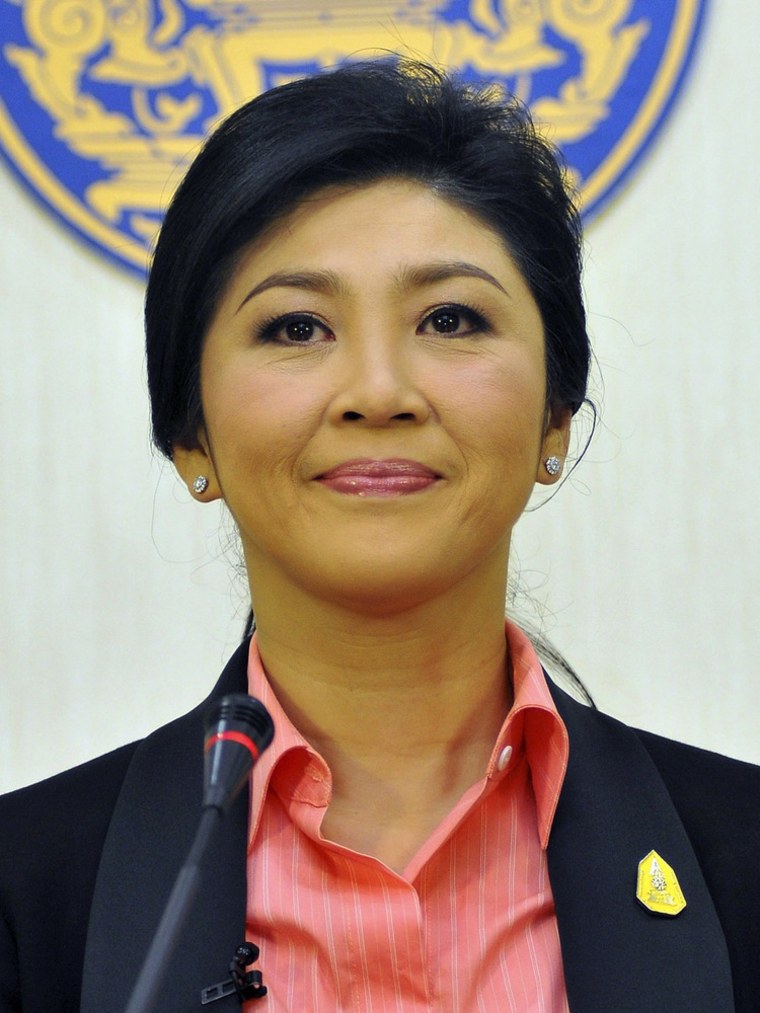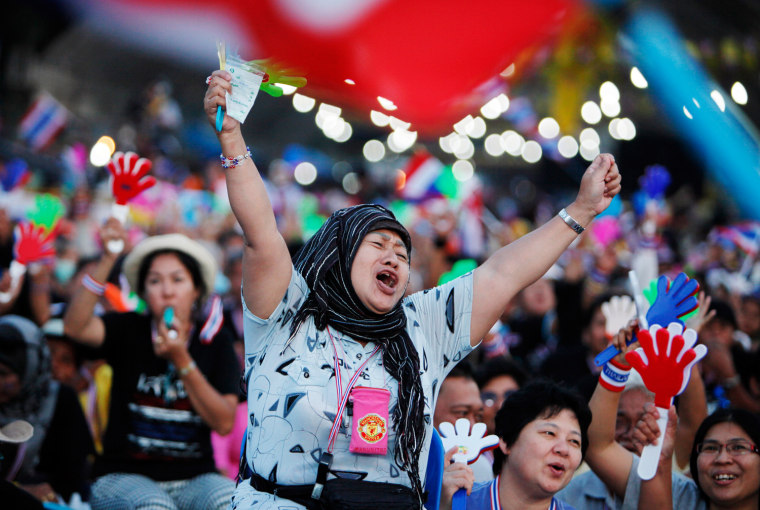BANGKOK — Thailand's prime minister announced Monday she will dissolve the lower house of Parliament and call early elections in an attempt to calm the country's deepening political crisis. The surprise move came as an estimated 100,000 protesters vowing to overthrow her government marched through the streets of Bangkok for a "final showdown."
It was not clear if Prime Minister Yingluck Shinawatra's move would satisfy protesters who say they will not settle for her ouster but instead want to rid Thailand of her politically powerful family's influence.
Yingluck appeared emotional and her voice shook as she spoke in a nationally televised address Monday morning.

"After listening to opinions from all sides, I have decided to request a royal decree to dissolve Parliament," Yingluck said, breaking into regular programming. "There will be new elections according to the democratic system."
She said the Election Commission would set a date "as soon as possible" and that she would remain in a caretaker capacity until the election of a new prime minister. As a formality, the king must approve the dissolution, after which elections must be held within 60 days.
Thailand has been plagued by political turmoil since the army toppled Yingluck's brother Thaksin in a 2006 coup. The protesters accuse Yingluck of serving as a proxy for her brother, who lives in self-imposed exile in Dubai to avoid jail time for a corruption conviction he says was politically motivated.
In broad terms, the conflict pits the Thai elite and the educated middle class against Thaksin's power base in the countryside, which benefited from populist policies designed to win over the rural poor.
Protest leaders called for a peaceful march Monday, but many feared the day could end violently when demonstrators converge from nine locations on Yingluck's office at Government House. More than 60 Thai and international schools in Bangkok have closed as a precaution.
As Yingluck spoke, long columns of protesters paralyzed traffic on major Bangkok boulevards. Police estimated that about 100,000 protesters were out on the streets of the Thai capital.
Leaders of the movement made no immediate reaction to Yingluck's announcement, but many protesters dismissed the development as insufficient.
"We will keep on protesting because we want her family to leave this country," said Boonlue Mansiri, one of tens of thousands who joined a 20-kilometer (12-mile) march to Yingluck's office.
The sentiment was the same across town, where protesters filled a major four-lane road in the city's central business district, waving flags, blowing whistles and holding a huge banner that said, "Get Out, Shinawatra."
Asked about the dissolution of Parliament, one middle-aged woman in the crowd said, "It is too late," and "It's not enough."
"At the end of the day, we are going to win," said the woman, who identified herself as Paew. "What happens now? Don't worry. We will figure it out."
Protest leader Suthep Thaugsuban said he would announce his reaction once his march reached Government House. Suthep has repeatedly said that calling fresh elections would not be enough to end the conflict. He has demanded that a non-elected "people's council" lead the country instead, an idea that has been criticized as utopian and undemocratic.
"We will rise up. We will walk on every street in the country. We will not be going home again," Suthep said Sunday. His supporters on Monday appeared to abandon the two places they had occupied for more than a week — the Finance Ministry and part of a vast government complex. "The people who will be going home empty-handed are those in the Thaksin regime."
The country's political standoff deepened Sunday after the main opposition party resigned from the legislature en masse to join the anti-government demonstrations. The Democrats held 153 of the 500 seats in the legislative body, according to the latest figures on their website.
The minority Democrats — who are closely allied with the protesters — have not won an election since 1992, and some of their leaders appear to have given up on electoral politics as a result.
Yingluck's government, by contrast, came to power in a landslide vote in 2011 that observers said was free and fair.
Abhisit Vejjajiva, the leader of the Democrat Party and a former premier, led one of the marches through Bangkok on Monday. He declined to comment on whether the party would participate in the next election.
Since the latest unrest began last month, at least five people have been killed and at least 289 injured. Violence ended suddenly last week as both sides paused to celebrate the birthday of the nation's revered king, who turned 86 Thursday.
The crisis boiled over after Yingluck's ruling party tried to ram a controversial amnesty bill through the legislature. Critics say it was designed mainly to bring Thaksin home to Thailand a free man.
In a speech Sunday, Yingluck said again that she was not trying to cling to power and would be "happy to resign" and dissolve Parliament if that could ease the crisis. Yingluck also reiterated an offer to set up a national forum to find a way out of the crisis.
